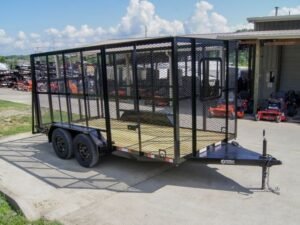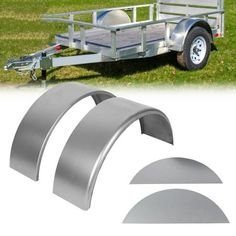If you’re asking yourself, “Do trailers need fenders?” the answer is a resounding yes. Trailer fenders aren’t just an optional add-on or a minor detail—they are a crucial component for the safety, legality, and overall functionality of your trailer.
Imagine driving down a busy highway without fenders; rocks, mud, and debris flying everywhere, creating a hazard for you and everyone else on the road. This is exactly why trailer fenders are so important.
Plus, in many places, having proper fenders is required by law. So, if you’re still on the fence about fenders, let’s dive into the top reasons why trailers absolutely need fenders and what makes them an essential part of your trailer setup.
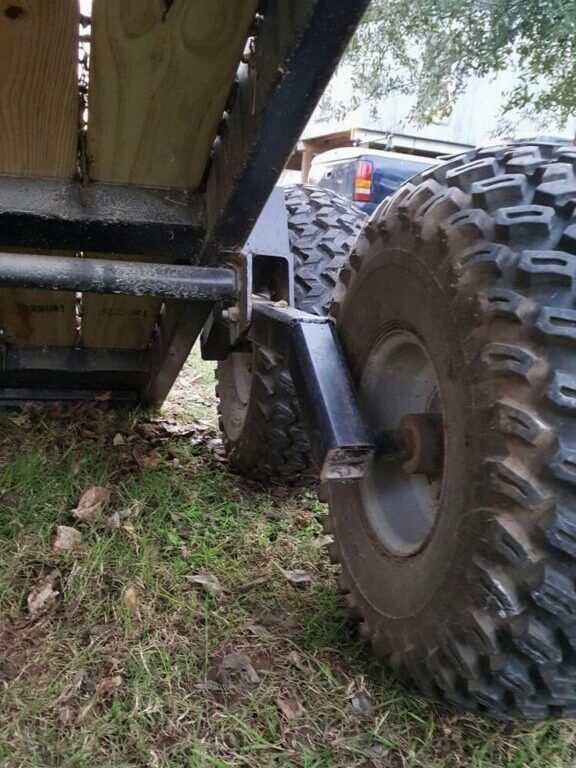
Do Trailers Need Fenders for? Safety, Legal, and Practical Reasons
There’s more to trailer fenders than meets the eye. Here’s why they are essential:
1. Protecting Everyone on the Road:
The primary reason trailers need fenders is safety. When a trailer is moving, its wheels can kick up all sorts of debris—rocks, gravel, mud, and water. Without fenders, this debris becomes airborne and can damage other vehicles, crack windshields, or even injure pedestrians and cyclists. Trailer fenders act as a guard, containing the debris and ensuring your trailer doesn’t turn into a road hazard.
2. Stay Legal and Steer Clear of Fines and Penalties
In many places, it’s not just about keeping others safe—it’s about staying compliant with the law. Regulations, like those set by the Department of Transportation (DOT) in the United States, mandate that trailers must have fenders or splash guards. Failure to comply can result in hefty fines, legal issues, and in some cases, accidents that lead to lawsuits. This makes trailer fender laws a key reason why every trailer owner should take fenders seriously.
For more information on trailer fender regulations and compliance, visit the U.S. Department of Transportation (DOT) Vehicle Equipment Standards page.
3. State or Country-Specific Regulations
Now, let’s dig a little deeper. Different states and countries have their own specific rules when it comes to trailer fender regulations. Some places are stricter than others.
In the USA: Most states require trailers to have fenders or splash guards. States like Florida, California, and New York have more stringent rules to prevent road accidents and ensure safety.
In Canada: Canadian provinces also have similar regulations. For example, Ontario and British Columbia have clear mandates that trailers must be equipped with proper fenders.
In Australia: The Australian Design Rules (ADR) specify that trailers must have guards that protect other road users from wheel spray.
4. Keep Your Trailer in Great Shape and Protect Your Investment
Think of trailer fenders as armor for your trailer. They protect the trailer’s wheels, body, and other vital parts from debris, road grime, and stones that could cause significant damage. Without fenders, every journey could result in scratches, dents, or worse. Over time, this damage adds up, potentially leading to costly repairs or reducing your trailer’s resale value. By investing in quality trailer fender kits, you’re making sure your trailer stays in good condition and lasts longer.
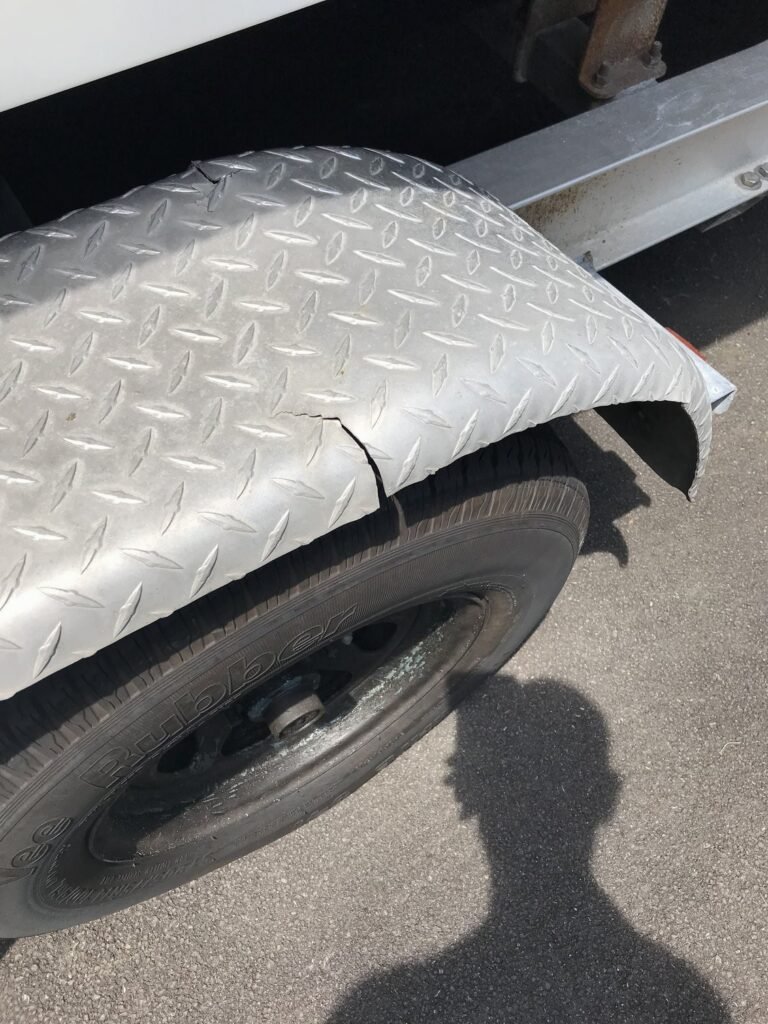
5. Reducing Maintenance Hassles:
Without fenders, your trailer’s undercarriage and wheels are exposed to all sorts of mess—mud, water, dirt, you name it. This not only means more frequent cleaning but also increases the risk of rust and corrosion, particularly on steel trailer fenders. With fenders, you minimize these issues, saving you time on maintenance and money on repairs. In other words, they pay for themselves by reducing the hassles and costs associated with frequent upkeep.
6. Enhancing Aesthetics:
Let’s not forget the style factor. Fenders can significantly enhance the look of your trailer, giving it a polished, finished appearance. If you’re someone who loves to personalize your vehicles, custom trailer fenders offer a great way to add a unique touch. Whether you prefer the sleek look of aluminum trailer fenders or the rugged feel of steel fenders, there’s an option out there that will make your trailer stand out, adding both safety and style
7. Protecting Pedestrians and Cyclists:
It’s not just other vehicles that fenders protect. Pedestrians and cyclists are also at risk from debris thrown up by trailer wheels. Without proper fenders, trailers could send rocks or debris flying onto sidewalks or bike lanes, creating dangerous situations. The legal requirements for trailer fenders often take this into consideration, ensuring that trailers are safe for everyone, not just drivers.
8. Reducing the Risk of Hydroplaning and Splash Hazards
Water on the road is another hazard that fenders help to manage. When a trailer’s wheels hit a puddle, the water gets displaced and can be thrown into the air, potentially landing on another vehicle’s windshield. In rainy conditions, this can be a significant hazard. Trailer fenders, especially on boat trailers or enclosed trailers, help direct the water downwards and away from other vehicles, reducing the risk of accidents.
Do Trailers Need Fenders on All Types of roads?
While most trailers need fenders, there are exceptions. Some smaller trailers or those used off-road may not have the same requirements. However, it’s always best to err on the side of caution. If you’re not sure whether your trailer needs fenders, check with your local motor vehicle department or the relevant authority.
Special cases include off-road trailers, which may not need fenders because they are not used on public roads. But again, it’s important to know the specific laws in your region to avoid any issues.
Types of Trailers Fenders According to Durability, Appearance, Weight, Installation, and Maintenance
When choosing the right fenders for your trailer, it’s essential to understand the pros and cons of the various materials available. Steel, aluminum, and plastic trailer fenders each offer different benefits in terms of durability, appearance, weight, installation ease, and maintenance. Here’s a detailed breakdown of each type to help you make the best decision.
Steel Trailer Fenders for Ultimate Durability and Strength
Steel fenders are known for their toughness and durability, making them ideal for trailers that endure heavy use and rough conditions. They provide robust protection and are less likely to crack or break compared to other materials.
- Durability: Steel trailer fenders are incredibly durable and can withstand significant impacts. They’re perfect for tandem axle trailers and trailers that haul heavy loads or travel over rough terrains. However, steel is prone to rust if not maintained properly, especially in wet or salty environments. Applying a rust-resistant coating or regular upkeep is essential to keep them in good shape.
- Appearance: Steel fenders have a rugged, sturdy look that can give your trailer a strong, professional appearance. However, they may not have the sleek finish of aluminum fenders. They can be painted to match your trailer, but maintaining that look might require more effort due to the risk of rust.
- Weight: Steel fenders are heavier than their aluminum or plastic counterparts. This added weight can affect your trailer’s overall weight, potentially impacting towing capacity and fuel efficiency. For trailers where weight is a concern, steel may not be the best choice.
- Installation: Installing steel fenders can be a bit more challenging due to their weight and sturdiness. They might require heavy-duty mounting brackets and more effort during installation. If you’re considering DIY, make sure you have the right tools and some extra muscle.
- Maintenance: Steel fenders require regular maintenance to prevent rust and corrosion. Regular cleaning and applying a protective coating can help extend their lifespan. If a steel fender gets dented, it can often be hammered back into shape, but rust spots need immediate attention to prevent spreading.
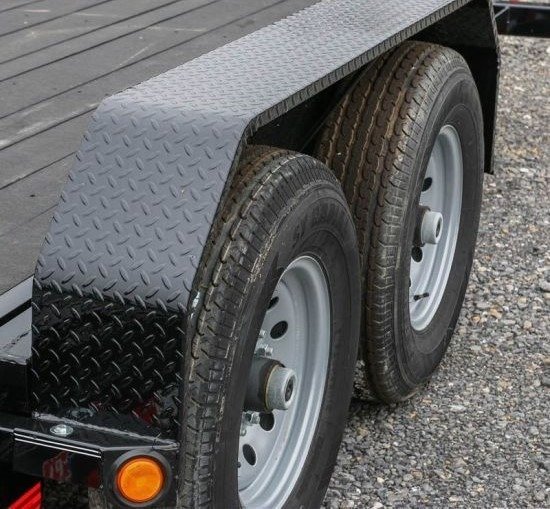
2. Aluminum Trailer Fenders for Lightweight and Rust-Resistant:
Aluminum fenders strike a great balance between strength, weight, and rust resistance. They are a popular choice for trailers that operate in wet environments, like boat trailers, because they don’t rust like steel.
- Durability: While not as tough as steel, aluminum trailer fenders are still highly durable. They are resistant to rust and corrosion, making them a great option for trailers exposed to water or salty air. However, aluminum can dent more easily than steel under heavy impact, so it may not be ideal for extreme off-road conditions.
- Appearance: Aluminum fenders have a sleek, shiny appearance that gives trailers a polished and professional look. They are an excellent choice for commercial or business trailers where appearance matters. They tend to retain their finish longer than plastic and can look new for years with minimal care.
- Weight: One of the significant advantages of aluminum fenders is their lightweight nature. They provide strength without the bulk, which helps improve fuel efficiency and makes them easier to handle. If you want to keep your trailer as light as possible, aluminum is an excellent choice.
- Installation: Aluminum fenders are relatively easy to install, though they might require specific mounting hardware due to their rigidity. They are lightweight enough for a single person to handle during installation, making them a good choice for DIYers.
- Maintenance: Maintenance for aluminum fenders is minimal—just a simple wash to remove dirt and debris is usually enough. Because they don’t rust, there’s no need for special treatments. However, be cautious of dents; they can be more difficult to repair compared to steel.
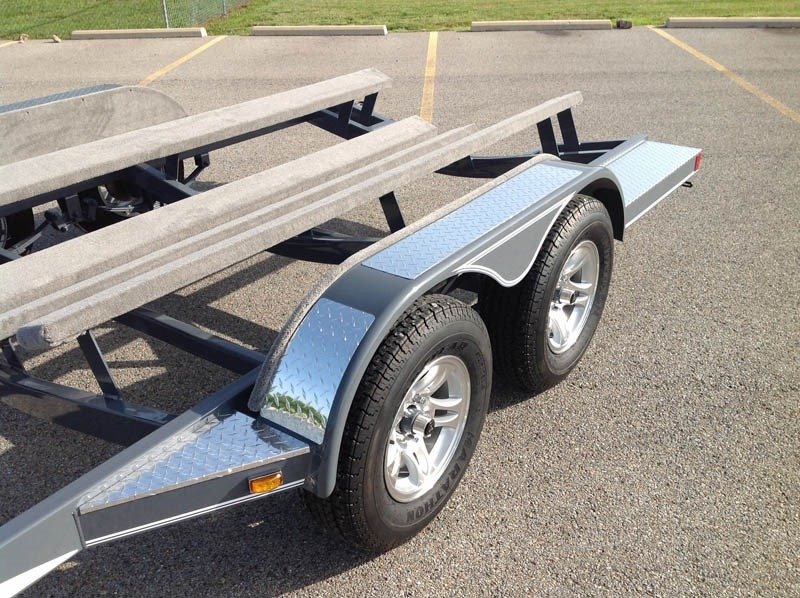
3. Affordable and Easy to Handle Plastic Trailer Fenders:
Plastic fenders are the most budget-friendly option and are great for utility trailers or those not subjected to heavy-duty use. They are resistant to rust and corrosion, making them a low-maintenance choice for many trailer owners.
- Durability: Plastic fenders are durable in their own way—they resist rust and corrosion completely. However, they might not be as long-lasting as steel or aluminum. Over time, plastic can become brittle, especially if exposed to extreme temperatures or UV rays, which may lead to cracks under heavy impact.
- Appearance: Plastic trailer fenders come in various styles and colors, providing flexibility if you want to match them with your trailer’s design. However, they might not have the “high-end” appearance of aluminum or the sturdy look of steel. Over time, plastic fenders may fade or become dull if exposed to the sun.
- Weight: Plastic fenders are the lightest option, making them incredibly easy to install and handle. Their lightweight nature doesn’t add much to the overall weight of your trailer, which can be beneficial for towing efficiency.
- Installation: Installation is straightforward and often requires only basic tools. Plastic fenders can be attached with simple mounting brackets, making them ideal for quick DIY projects. They are also easy to replace if they get damaged.
- Maintenance: Maintenance for plastic fenders is almost non-existent. They don’t rust, so you don’t have to worry about corrosion. However, you might need to address scratches or cracks with some DIY repair kits or consider replacement if the damage is severe.

Choosing the Right Fender for Your Trailer
Choosing between steel, aluminum, and plastic trailer fenders comes down to your specific needs and how you plan to use your trailer. If you need maximum durability and are okay with some extra weight and maintenance, steel fenders are a solid choice. For those looking for a lightweight, rust-resistant option with a sleek look, aluminum fenders are the way to go. And if budget and ease of installation are your main concerns, plastic fenders offer a practical and affordable solution.
No matter which type you choose, make sure it aligns with your trailer’s requirements and your personal preferences to ensure a safe, stylish, and efficient towing experience!
Do Trailers Need Fenders for Both Single and Tandem Axles?
Another important factor to consider is whether your trailer has a tandem axle or a single axle. This determines the size and type of fender you need.
- Tandem Axle Trailer Fenders: These are designed for trailers with two sets of wheels. They cover more area and often provide better protection against debris. They are usually larger and may be made from more durable materials like steel or aluminum.
- Single Axle Trailer Fenders: These are for trailers with just one set of wheels. They’re smaller and typically easier to install. You can find them in all types of materials, but plastic trailer fenders are a popular choice due to their cost-effectiveness and easy installation.

Unique Style and Perfect Fit Custom Trailer Fenders:
Custom fenders let you personalize your trailer with unique colors, styles, and materials, ensuring a perfect fit for any trailer type.
Material Choices for Every Need
Choose from heavy-duty steel, lightweight aluminum, or versatile plastic to match your trailer’s requirements.
Buy or DIY Custom Fenders
Find custom fenders from specialty shops or make your own for a personalized touch.
Functional Benefits of Custom Fenders
Custom fenders can add storage compartments or improve aerodynamics for better fuel efficiency.
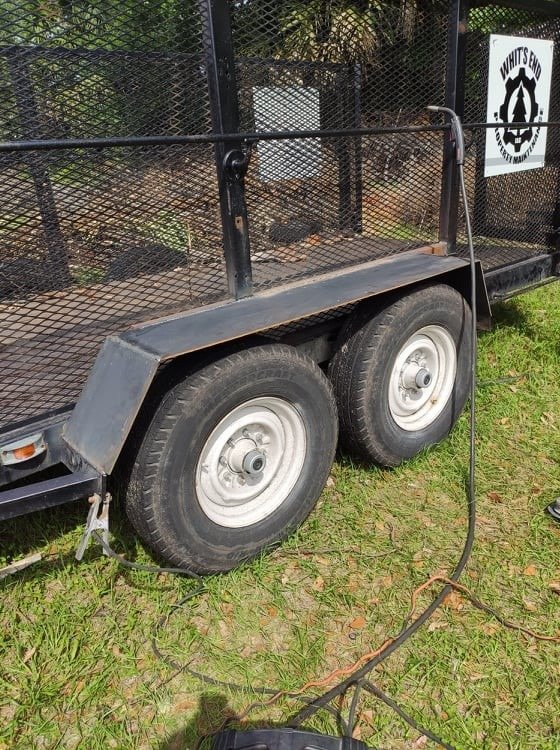
Which Fender is Best for Your Trailer?
So, which fender is right for you? The best choice depends on a few factors:
- Type of Trailer: A boat trailer may require a different kind of fender compared to an enclosed trailer. For example, boat trailers often need corrosion-resistant fenders like aluminum or plastic.
- Usage: If you frequently haul heavy loads or drive in rough conditions, you might want to invest in steel trailer fenders.
- Budget: If you’re on a budget, plastic trailer fenders can do the job without breaking the bank.
Step-by-Step Guide to Installing Trailer Fenders
Now that you understand why fenders are so important, you might be thinking about installing them on your trailer. Don’t worry—it’s not as hard as you might think! With the right tools and a bit of guidance, you can install fenders yourself. Before you start, it’s crucial to ensure you have the correct measurements for your fenders.
If you’re unsure about how to measure properly, we’ve got you covered with a detailed guide on the topic: How to Measure Trailer Fenders.
How to Maintain and Repair Trailer Fenders
Once you’ve got the right fenders installed on your trailer, the next step is to make sure they last as long as possible. Proper maintenance and quick repairs are key to ensuring your trailer fenders stay in great shape, providing the protection and style you need.
1. Regular Maintenance Tips for keeping Your Fenders in Good Shape :
Like any other part of your trailer, fenders need some TLC to keep them looking good and functioning well. Here are some maintenance tips to help you out:
- Regular Cleaning: Dirt, mud, and road grime can accumulate on your fenders over time. Regularly washing your steel, aluminum, or plastic trailer fenders will help prevent rust (especially on steel) and keep them looking sharp.
- Inspect for Damage: Every few months or before a long trip, inspect your fenders for any signs of wear and tear. Look for cracks, dents, or rust spots. Even a small crack in a plastic trailer fender can grow over time, leading to more significant problems.
- Apply a Protective Coating: For steel trailer fenders, applying a rust-resistant coating or paint can go a long way in preventing rust and corrosion. A simple primer and paint job can add years to the life of your fenders.
- Tighten Loose Bolts: Over time, the bolts holding your fenders in place can loosen up, especially if you’re driving on bumpy roads. Check these bolts regularly and tighten them to ensure your fenders stay securely in place.
2. Common Issues and DIY Fixes:
No matter how careful you are, fenders can get damaged. Here are some common issues you might face and how to fix them:
- Dents in Steel Fenders: If you have a dent in your steel trailer fender, you can often fix it yourself with a rubber mallet. Simply tap out the dent from the inside, being careful not to hit too hard and create more damage. If the dent is severe, you might need to take it to a professional for repair.
- Cracks in Plastic Fenders: For plastic trailer fenders, cracks are a common problem. Small cracks can be fixed using epoxy or plastic welding. For larger cracks, it might be more cost-effective to replace the fender entirely.
- Rust on Steel Fenders: Rust can be a serious issue for steel trailer fenders. If you notice rust forming, use a wire brush to remove the rust down to the metal, then apply a rust-resistant primer and paint. It’s better to address rust early before it spreads and weakens the fender.
- Scratches on Aluminum Fenders: While aluminum trailer fenders are rust-resistant, they can still get scratched. For minor scratches, a bit of aluminum polish can help buff them out. For deeper scratches, you might need to sand down the area and re-polish it.
3. When to Replace Your Fenders
Sometimes, repairs just aren’t enough, and it’s time to replace your fenders. If your fender has a severe crack, extensive rust, or major dents that affect its functionality, it’s safer and more practical to replace it. You can easily find trailer fender kits online or at trailer supply stores, which usually come with everything you need for a replacement.
Do Boat Trailers Need Special Fenders?
Yes, boat trailers need fenders due to their unique exposure to water, especially saltwater, and the rough paths they often travel. Here’s what you need to consider:
- Durability and Corrosion Resistance: Aluminum fenders are ideal as they resist rust and corrosion, making them great for wet and salty environments. Plastic fenders are also corrosion-resistant and lightweight but may not offer the same strength as aluminum, especially on rough terrain.
- Size and Fit: Proper coverage is crucial for safety. Measure your tires carefully to ensure the fenders fit well and comply with regulations. Tandem axle trailers need longer fenders, while single axle trailers can use standard sizes.
- Extra Features: Consider fenders with non-slip steps for safer boat access and reflective strips or lights for better visibility during night towing.
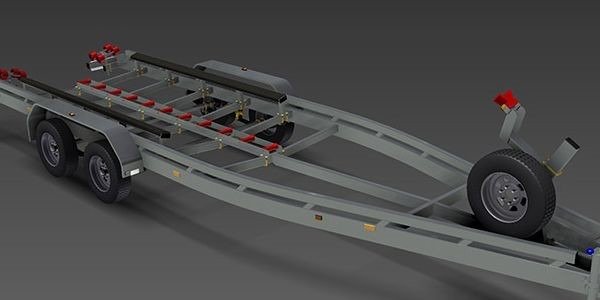
Do Trailers Need Fenders, or Are There Alternatives?
While trailer fenders are the most common choice for protecting trailers and other vehicles on the road, some people wonder if there are any alternatives. While nothing quite replaces the effectiveness of a good set of fenders, there are a few alternatives that might suit specific needs. Let’s explore these options and see how they stack up against traditional fenders.
1. Trailer Mud Flaps:
Mud flaps are a common alternative to fenders, and while they offer some protection, they don’t quite do the full job that fenders do.
- Pros of Mud Flaps: Mud flaps are generally easier to install and can provide some protection against mud, rocks, and debris. They are often used in combination with fenders to offer extra protection, especially on large trailers and trucks. Mud flaps can also be customized with different materials and designs, offering some flexibility.
- Cons of Mud Flaps: Unlike fenders, mud flaps don’t provide complete coverage of the wheels. They hang behind the wheel and only protect from debris that gets flung backward. This means that they don’t prevent debris from flying sideways or upwards, which could still pose a risk to other vehicles or pedestrians.
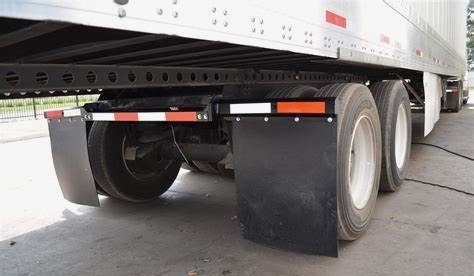
2. Trailer Splash Guards:
Splash guards are another option that some trailer owners consider, but they come with limitations.
- Pros of Splash Guards: Like mud flaps, splash guards are relatively easy to install and can be a good addition for reducing water spray, especially on wet roads. They’re often made from rubber or plastic, which makes them flexible and durable.
- Cons of Splash Guards: However, splash guards, like mud flaps, don’t provide full coverage. They’re mainly effective for keeping water spray down but won’t do much to stop rocks or larger debris from being kicked up by the trailer wheels.

3. Side Guards:
For those looking to go the extra mile in trailer safety, side guards can be an interesting addition. These are not an alternative to fenders but rather an extra safety feature that can work alongside fenders.
- Benefits of Side Guards: Side guards are designed to prevent pedestrians, cyclists, or smaller vehicles from sliding under the trailer in the event of a collision. They add an additional layer of safety that fenders alone cannot provide.
- Considerations: While side guards can enhance safety, they won’t replace fenders’ role in protecting against debris and maintaining legal compliance. They can be a good addition but should not be seen as a substitute.
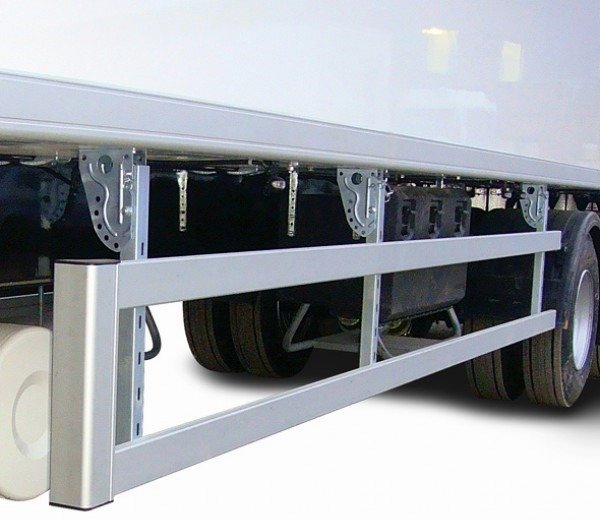
Conclusion:
Trailer fenders are more than just a requirement—they’re essential for safety, legal compliance, and protecting your trailer from damage. Whether you need robust steel, lightweight aluminum, or cost-effective plastic fenders, choosing the right ones helps keep roads safer, reduces maintenance, and enhances your trailer’s appearance. Make the smart move: install quality fenders and drive with peace of mind.
Frequently Asked Questions (FAQs) About Trailer Fenders
When it comes to trailer fenders, there are always some burning questions that people have. Whether you’re new to the world of trailers or a seasoned pro, knowing the answers to these common queries can help you make the best decisions for your trailer’s safety and performance. In this section, we’ll answer some of the most frequently asked questions about trailer fenders.
1. Are Fenders a Legal Requirement for Trailers?
A question that often comes up is, “Are fenders a legal requirement for trailers?” The short answer is yes, in most cases, they are.
Different states and countries have specific regulations when it comes to trailer safety, and fenders are often a big part of that. The Department of Transportation (DOT), for instance, has clear guidelines that require trailers to have fenders or splash guards to help minimize road debris. The purpose of these regulations is to prevent rocks, mud, and other debris from being thrown into the air, potentially causing accidents or damage to other vehicles on the road.
So, if you’re driving a utility trailer, enclosed trailer, or any other type of trailer, it’s important to ensure it is equipped with the proper fenders. Not only does this keep you compliant with the law, but it also ensures the safety of everyone on the road.
2. Can You Add Fenders to Any Trailer?
Another common question is, “Can you add fenders to any trailer?” The answer is absolutely yes.
Almost any trailer can be equipped with fenders, whether it’s a single axle or tandem axle trailer. The key is to choose the right size and type of fender that fits your trailer’s specific needs. For example, if you have a boat trailer, you’ll want to consider aluminum trailer fenders that are resistant to rust and corrosion. If you have a utility trailer, plastic fenders might be a cost-effective and easy-to-install option.
When adding fenders to your trailer, it’s crucial to measure your wheels accurately to ensure a good fit. This includes considering the wheel size, axle type, and the amount of coverage you want. Trailer fender kits are available that come with everything you need for a DIY installation, making the process straightforward even for beginners.
3. What is the Best Material for Trailer Fenders?
People often ask, “What is the best material for trailer fenders?” The best material depends on your specific needs, budget, and how you plan to use your trailer.
- Aluminum Fenders: Great for corrosion resistance, lightweight, and ideal for boat trailers or trailers used near the ocean.
- Steel Fenders: Highly durable and strong, best for heavy-duty trailers that carry significant loads. However, they are prone to rust without proper maintenance.
- Plastic Fenders: Affordable, lightweight, and easy to install. These are great for light-use trailers but may not be as durable as steel or aluminum.
Each material has its pros and cons, so consider your specific use case before making a decision.

